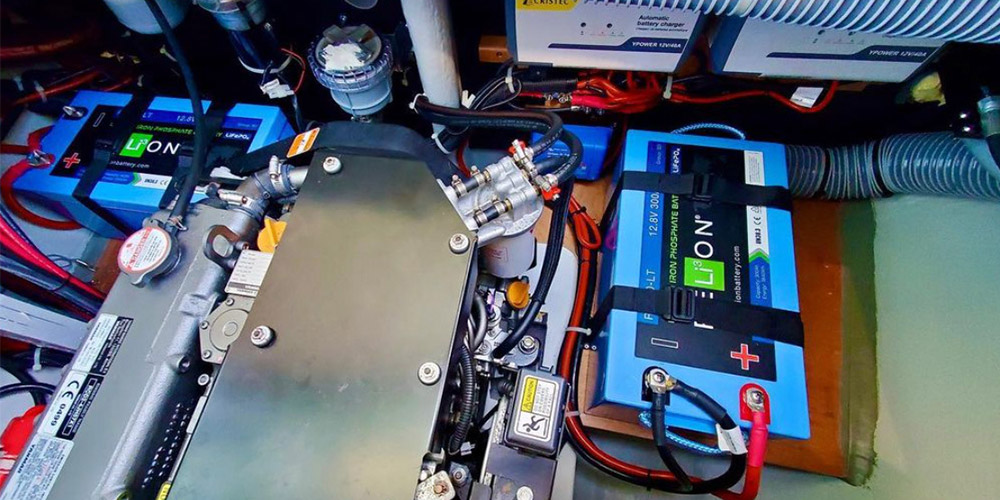A larger and more efficient battery bank is a fantastic upgrade to any boat, and with today’s technology, a lithium battery system offers that. Lithium-based batteries are becoming more prevalent in almost every facet of life, so the technology and chemical compounds are changing quickly. The current standard for marine lithium batteries is a Lithium Iron Phosphate (LiFePO4) battery. Compared to the older cobalt-based lithium-ion batteries, the new generation is safer, more efficient, and has a longer lifespan.
The other key piece of technology that has increased lithium safety and reliability is a Battery Management System or BMS. A BMS monitors each cell of the battery for temperature and voltage. It also offers the ability to disconnect batteries and cells from the rest of the electrical system in the boat These units are often made by the same manufacturer as the rest of the charging system, so they connect and share data with the charger.
A discussion of a lithium battery system often includes insurance and what effects the new batteries would have on coverage. With lithium installations becoming more common in the marine setting, the ABYC has created a standard that all systems should follow. Just like any major electrical work, all lithium projects should be handled by an ABYC-certified shop. They have named the guidelines around lithium batteries E-13. Mike Hobson, of PKYS, did a more in-depth dive into insurance and lithium on his blog
By greatly expanding the capacity of the batteries, a lithium system also opens the doors to some pretty cool features. Imagine a full night’s use of air conditioning running in complete silence. Another option could be to have your SeaKeeper running all day while out on anchor and without the generator running or even installed.
Currently, the rough cost of a lithium-ion battery bank and all of the associated systems runs around $15k for a boat in the 30-foot range. Across all markets in the US, the cost of lithium-ion batteries per kilowatt-hour has been on a steep decline for the past 10 years. Dropping by around $640 per kilowatt-hour. This looks rather favorable when compared to the $20-22k that a generator install would cost and I would expect battery prices to keep getting more competitively priced. The lithium setup also reduces the weight of the boat when compared to a generator. Not only are you removing the weight of the generator itself, it is also the fuel lines and other associated systems that are no longer needed. In the North Point shop, we have been able to add SeaKeepers to smaller boats by converting to lithium-ion and not having a generator in the way.
The other major boat system that conventionally requires a generator is air conditioning, but lithium can change that. The most efficient way to achieve this is with a DC powered air conditioner backed by lithium batteries. Most A/C units run on AC power, so either a generator or inverter would be needed. The newest generation of DC powered A/C units allows battery power to be utilized much more efficiently. In the real world, I have found that the DC units are slightly less powerful compared to the AC unit. For example, a 40-foot sailboat that would normally only need one AC unit might need two DC units. They also tend to cool a little slower. This can be overcome by keeping the boat sitting at a cool temperature most of the time. This avoids the need for an aggressive fast cool down and means the A/C unit just needs to maintain temperature. We did an installation on a 30-foot powerboat and predicted 8 hours of A/C run time on battery power. The idea was to provide a full night’s sleep with A/C running while out on anchor.
Even if you aren’t quite ready to swap your boat over from conventional batteries, the market is pointed in that direction. I would ensure that any battery charger or similar device installed on any of my client’s boats moving forward would be lithium-ready.
Victron has been producing some really great products for marine applications that are very compatible with lithium. They also offer a fantastic user interface that provides easy to understand battery data. Victron offers a complete lithium system including batteries with a built-in BMS, this allows for a very clean installation.


